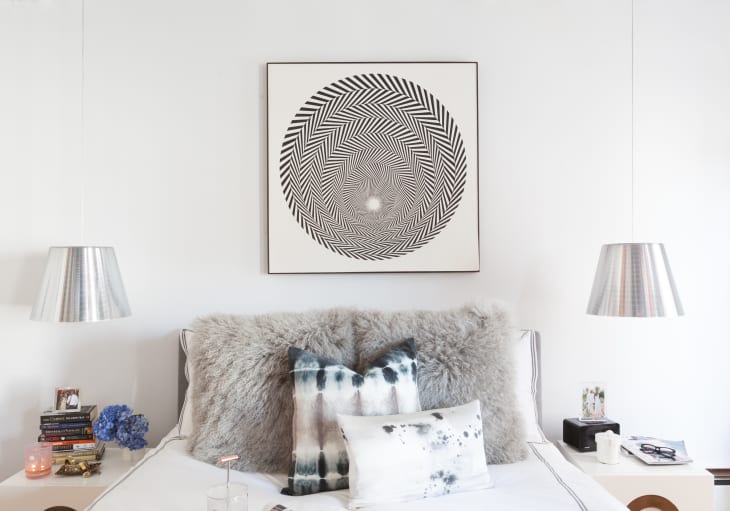I Tried 5 Different Tricks to Cure My Insomnia—Here’s What Worked, and What Didn’t
I’m one of those people who needs a square八小时的睡眠per night to function. But evenbefore the pandemic, I’ve struggled to make that happen. It normally takes me about thirty minutes tosuccumb to sleep一旦我做了,I wake up several times, tossing and turning due to anxiety about work the next day or, a far more common scenario, for literally no reason at all.
然后,世界大流行发生,撕裂有ver sleep routine I had before to shreds. Nowadays, it takes me up to an hour to fall asleep, and I’m waking up far more frequently—sometimes, my body feels like there’s electricity running through it, and I lie awake for a couple of hours. Finally, I’ll slip back into snooze-mode, but then, the sun rises, my kids demand breakfast, and I trudge through my day, daydreaming of the sleep I’ll one day get.
After a few weeks of restlessness, I’ve decided to hone in on finding the ideal sleep routine—and I’m grateful to say I’m turning a corner. At the end of my experiments, I’m not falling asleep faster (usually within 20 minutes), but I’m getting longer stretches of what feels like restorative sleep.
If you, too, are seeking some strategic ways to conquer pandemic insomnia, here are a few of the things that worked—and didn’t work—for me.
CBD
I’m a long-time CBD oil user. I keep a liquid CBD in my bedside table and swallow a few pumps of it before I go to bed, and then sometimes again if I can’t fall asleep. While CBD is normally a helpful tool if I’m tossing and turning, by itself, it hasn’t been enough to conquer pandemic-level insomnia. I’ll keep using it, but during this particularly anxious time, I know I’ll need to do more than just pop some CBD.
Exercise
I’ve heard a million times that exercise is majorly beneficial for sleep. But now I know if you do your exercise at the wrong time, your workout could have the opposite effect. Since I’m taking care of my kids and working during the day, I walked 1-2 miles a couple nights a week for three weeks. It was nice to get some alone time and fresh air, but being active right before bed hyped me up. It took me twice as long to fall asleep when I walked at night.
However, when I made time to walk during the morning, I noticed a huge difference in my daytime mood and my ability to fall asleep at night. Going out for a long walk before lunch is going to be part of my wellness routine from here on out.
Magnesium
I always keep magnesium supplements on hand for a few reasons: to loosen up muscle tension and to help relax my body for sleep. The powdered supplement I take is really gentle and helpful. I noticed a subtle difference in sleep quality and duration when I took my magnesium supplement an hour or so before bedtime—my body felt more relaxed, and as a bonus, my usual weekly tension headache never became incapacitating. I’d definitely recommendthis magnesium supplementfor anyone who gets headaches, muscle pain, or has trouble sleeping.
Cutting out alcohol
A glass of Pinot definitely helps me wind down, but I always wake up so much more on the nights I have more than one drink. So I decided to experiment with not drinking altogether for a week, and it was a major game-changer. I woke up once on average on the nights I didn’t drink, compared to my normal 3-4 times. I’ll admit, on the nights I skipped the wine, it was a little harder to fall asleep. But after a few pumps of CBD oil and some mindful, focused breathing, I was zonked.
Opening up my bedroom window
I think the most important thing I’ve done is adjusting the temperature. I talked to a sleep doctor for another article recently, and he told me that the ideal sleep temperature is around 60-65 degrees Fahrenheit. Usually, my house is around 69-70 degrees, which felt fine, but in retrospect probably wasn’t doing my sleep any favors. So I started experimenting with temperature. I didn’t feel like turning on the AC yet, because it’s not warm enough outside, so I tried opening the window. During my experiment, the temperature was dipping to 45-50 degrees at night, so my room got pretty chilly. And Ilovedit. I am not kidding when I say, I slept 6-7 hours without waking up once, which is a huge improvement from the 3-4 interrupted hours I was getting before.
The verdict
Trying all these things showed me what my mind and body need for healthy sleep. I want to get out and exercise in some way each day, but I’m going to try to keep any vigorous activity to before noon. I also want to limit my alcohol intake, especially during the week, and I plan to keep taking my CBD and magnesium supplements as needed. But the biggest eye-opener was how beneficial colder temperatures are for me. From now on, I’ll be sleeping with my window open at night (or cranking the AC on hot summer days).
For anyone else struggling with sleep, I’d say the biggest lesson I learned was that, while there are some common wellness practices that benefit sleep for all of us, it can take some time to find the routine that works for you. It may take a little time and strategy, but those glorious hours of shut-eye are worth your while.
Read more:How to Sleep in the Midst of a Global Pandemic

